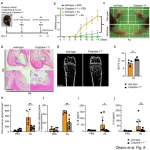(Press-News.org) Staging of patients with early pancreatic cancer is inaccurate as much as 80% of the time, according to a new Cedars-Sinai Cancer study published in the peer-reviewed journal JAMA. The finding underscores the urgent need for advancements in diagnostic technology and staging, which could significantly alter early pancreatic cancer treatment and research.
In this study, investigators looked at data from more than 48,000 patients in the National Cancer Database. Based on preoperative imaging, all of the patients in the study had either stage 1 or stage 2 pancreatic cancer.
Following surgery to remove their tumors, more than 78% of stage 1 patients and more than 29% of stage 2 patients were upstaged—generally to a stage that includes lymph node involvement.
“Our research reveals that staging—essential for making treatment decisions and determining research eligibility—is often inaccurate in early-stage pancreatic cancer,” said Srinivas Gaddam, MD, associate director of Pancreatic Biliary Research at Cedars-Sinai and senior author of the study. “As the field is racing toward earlier diagnosis, early staging will become increasingly important.”
Diagnosis and staging of pancreatic cancer are difficult for the same reason. The pancreas, a digestive organ, is located deep in the body and current imaging technology isn’t always able to detect smaller tumors or lymph node involvement, said Gaddam, who is also an associate professor of Medicine and runs the Pancreatic Cancer Screening and Early Detection Program at Cedars-Sinai.
Lymph nodes, clusters of small immune structures, are an important factor in cancer staging and a key difference between early-stage and later-stage pancreatic cancer.
“Patients who have lymph node involvement have a worse survival rate than those without lymph node involvement,” Gaddam said. “When imaging is unable to detect lymph node involvement, staging may not reflect the true extent of the disease. Our findings suggest that lymph node involvement is being missed in four out of every five patients during the staging process.”
The five-year survival rate for stage 1 pancreatic cancer is more than 83%, but that drops to just 3% for patients with stage 4 disease—which is when most patients are currently diagnosed.
“Pancreatic cancer is a difficult diagnosis and there is a tremendous need to improve outcomes for patients,” said Dan Theodorescu, MD, PhD, director of Cedars-Sinai Cancer and the PHASE ONE Foundation Distinguished Chair. “Through leading-edge tools, such as our Molecular Twin Precision Oncology Platform, we are developing tests that will guide precision treatment of pancreatic and other cancers. We first demonstrated the utility of Molecular Twin by identifying new biomarkers for pancreatic cancer; these biomarkers assist in the diagnosis, which must be coupled with accurate cancer staging to appropriately guide therapeutics.”
Gaddam’s take-home message for clinicians staging pancreatic cancer is to recognize the limitations of current imaging technology and actively assess and report lymph node involvement. And for those at the forefront of innovation, he stresses the urgent need to improve screening and diagnostic technologies.
Pancreatic cancer screening employs MRI and endoscopic ultrasound. Screening is recommended for people with a family history of pancreatic cancer and those who carry variants in certain genes associated with the disease.
“We know that our current screening and staging tools aren’t great,” Gaddam said. “My hope is that within the next 10 years, we will develop advanced tools for screening and staging pancreatic cancer, allowing us to diagnose most patients at stage 1 and stage 2 rather than stage 4. With these advancements, we can catch this disease much earlier, improving outcomes for many more patients.”
Additional Cedars-Sinai authors of the study: Gerardo Perrotta, MD; Ghada Mohamed, MD; Brent K. Larson, DO; Arsen Osipov, MD; Cristina R. Ferrone, MD; Simon K. Lo, MD.
Funding: Srinivas Gaddam received funding from the AGA (American Gastroenterological Association) Research Foundation’s 2022 AGA-Bern Schwartz Family Fund Research Scholar Award in Pancreatic Cancer for time dedicated to research.
END
Pancreatic cancer: study finds most early staging inaccurate
Cedars-Sinai cancer investigators show that most patients with stage 1 and stage 2 cancer are upstaged after surgery
2024-09-05
ELSE PRESS RELEASES FROM THIS DATE:
Study shows fentanyl’s role in Oregon overdose spike after policy decriminalizing drug possession
2024-09-05
PROVIDENCE, R.I. [Brown University] — When overdose rates spiked in Oregon in 2021 after the state decriminalized low-level drug possession, blame quickly turned to the new state law. But a new study by researchers at the Brown University School of Public Health implicates another factor: the introduction of fentanyl into Oregon’s unregulated drug market.
“What's compelling about this analysis is that it follows the path of fentanyl across the country and offers testament to the ...
Vision impairment and the population attributable fraction of dementia in older adults
2024-09-05
About The Study: The population attributable fraction of dementia from vision impairments ranged from 4.9%-19.0%. While not proving a cause-and-effect relationship, these findings support inclusion of multiple objective measures of vision impairments, including contrast sensitivity and visual acuity, to capture the total potential impact of addressing vision impairment on dementia.
Corresponding Author: To contact the corresponding author, Jason R. Smith, ScM, email jsmit491@jhu.edu.
To access the embargoed study: Visit our For The Media website at this link https://media.jamanetwork.com/
(doi:10.1001/jamaophthalmol.2024.3131)
Editor’s ...
Balloon angioplasty vs medical management for intracranial artery stenosis
2024-09-05
About The Study: In patients with symptomatic intracranial atherosclerotic stenosis, balloon angioplasty plus aggressive medical management, compared with aggressive medical management alone, statistically significantly lowered the risk of a composite outcome of any stroke or death within 30 days or an ischemic stroke or revascularization of the qualifying artery after 30 days through 12 months. The findings suggest that balloon angioplasty plus aggressive medical management may be an effective treatment for symptomatic intracranial atherosclerotic stenosis, although the risk of stroke or ...
Cannabis laws and utilization of medications for the treatment of mental health disorders
2024-09-05
About The Study: This cross-sectional study of commercially insured patients suggests that there may have been meaningful heterogeneous associations between cannabis policy and state and between cannabis policy and drug class (e.g., decreases in dispensing of benzodiazepines but increases in dispensing of antidepressants and antipsychotics). This finding suggests additional clinical research is needed to understand the association between cannabis use and mental health. The results have implications for patient substance use and mental health–related outcomes.
Corresponding Author: To ...
New avenues for treating heart failure: uncovering a protective mechanism in the cardiac myocytes
2024-09-05
Researchers from Tokyo Medical and Dental University (TMDU) identify Mst1–FoxO1–C/EBP-ß signaling pathway that promotes heart cell survival
Tokyo, Japan – Understanding the mechanisms behind cell death and survival is crucial when it comes to conditions like heart failure, which affects millions of people worldwide. Now, researchers from Japan have identified a mechanism which protects cardiac myocytes against ischemia, or a lack of blood supply.
In this study published online on 25 July 2024 in Nature Communications, researchers from the Tokyo Medical and Dental ...
Shedding light on how oral bacteria can aggravate rheumatoid arthritis
2024-09-05
Tokyo Medical and Dental University (TMDU) researchers investigate the molecular mechanisms that link periodontal disease to rheumatoid arthritis
Tokyo, Japan – Periodontal disease, which affects the gums and tissues that surround the teeth, is one of the most prevalent dental conditions worldwide. Most often caused by the formation and accumulation of bacterial biofilm around the teeth, periodontal disease can ultimately lead to tooth loss if left unattended. Interestingly, the inflammatory effects of periodontal bacteria can go well beyond the mouth, leading to systemic effects. Over the past few decades, clinical studies have revealed that the periodontal ...
Regenstrief to host semiannual LOINC® conference in Washington, D.C., Sept. 17-20
2024-09-05
Regenstrief Institute will host its semiannual LOINC® conference September 17-20, 2024, in Washington, D.C.
LOINC, a global healthcare terminology standard, will be the subject of the three-day conference during which experts worldwide will collaborate during presentations across three points of emphasis: implementation and policy, innovation and mapping.
Keynote presenters will be:
Wednesday, September 18 – Jesse Ehrenfeld, M.D., MPH, the president of the American Medical Association.
Thursday, September ...
Cause, potential treatments ID'd for persistent COVID-19 lung problems
2024-09-05
Arthritis drugs already available for prescription have the potential to halt lingering lung problems that can last months or years after COVID-19 infections, new research from the University of Virginia School of Medicine and Cedars-Sinai suggests.
By examining damaged human lungs and developing an innovative new lab model, the scientists identified faulty immune processes responsible for the ongoing lung issues that plague an increasing number of people after they’ve otherwise recovered from COVID-19. These lasting harms of COVID infection, ...
Pregnant women exposed to PFAS may be at risk for obesity, heart disease later in life
2024-09-05
WASHINGTON—Women with higher levels of per- and polyfluoroalkyl substances (PFAS) during pregnancy may experience long-term weight gain and heart problems later in life, according to new research published in The Journal of Clinical Endocrinology & Metabolism.
PFAS are manmade chemicals found in food packaging, cookware, clothes, drinking water, personal care products and many other consumer goods. These endocrine-disrupting chemicals (EDCs) can interfere with hormones and cause health issues such as obesity, infertility and cancer.
“Our study supports the idea that pregnancy may be ...
Skin fungus colonization accelerates breast cancer tumor growth
2024-09-05
Washington, D.C. — A common skin fungus, Malassezia globosa may invade deep tissues through the skin or by other means, then cause tumor growth, according to a new study. The study results were reported in mBio, an open access journal of the American Society for Microbiology.
“It is important to take care of skin not only for beauty, but also for health,” said corresponding study author Qi-Ming Wang, Ph.D., a professor in the School of Life Sciences, Institute of Life Sciences and Green Development, Hebei University, Hebei, China. “As ...
LAST 30 PRESS RELEASES:
Alkali cation effects in electrochemical carbon dioxide reduction
Test platforms for charging wireless cars now fit on a bench
$3 million NIH grant funds national study of Medicare Advantage’s benefit expansion into social supports
Amplified Sciences achieves CAP accreditation for cutting-edge diagnostic lab
Fred Hutch announces 12 recipients of the annual Harold M. Weintraub Graduate Student Award
Native forest litter helps rebuild soil life in post-mining landscapes
Mountain soils in arid regions may emit more greenhouse gas as climate shifts, new study finds
Pairing biochar with other soil amendments could unlock stronger gains in soil health
Why do we get a skip in our step when we’re happy? Thank dopamine
UC Irvine scientists uncover cellular mechanism behind muscle repair
Platform to map living brain noninvasively takes next big step
Stress-testing the Cascadia Subduction Zone reveals variability that could impact how earthquakes spread
We may be underestimating the true carbon cost of northern wildfires
Blood test predicts which bladder cancer patients may safely skip surgery
Kennesaw State's Vijay Anand honored as National Academy of Inventors Senior Member
Recovery from whaling reveals the role of age in Humpback reproduction
Can the canny tick help prevent disease like MS and cancer?
Newcomer children show lower rates of emergency department use for non‑urgent conditions, study finds
Cognitive and neuropsychiatric function in former American football players
From trash to climate tech: rubber gloves find new life as carbon capturers materials
A step towards needed treatments for hantaviruses in new molecular map
Boys are more motivated, while girls are more compassionate?
Study identifies opposing roles for IL6 and IL6R in long-term mortality
AI accurately spots medical disorder from privacy-conscious hand images
Transient Pauli blocking for broadband ultrafast optical switching
Political polarization can spur CO2 emissions, stymie climate action
Researchers develop new strategy for improving inverted perovskite solar cells
Yes! The role of YAP and CTGF as potential therapeutic targets for preventing severe liver disease
Pancreatic cancer may begin hiding from the immune system earlier than we thought
Robotic wing inspired by nature delivers leap in underwater stability
[Press-News.org] Pancreatic cancer: study finds most early staging inaccurateCedars-Sinai cancer investigators show that most patients with stage 1 and stage 2 cancer are upstaged after surgery

